A Quote by Edward Boyden
If our brain is understanding some parts of the universe and not understanding other parts, and those understandings are about the laws of physics that our brains are built on top of, then it's kind of a loop, right?
Related Quotes
A successful unification of quantum theory and relativity would necessarily be a theory of the universe as a whole. It would tell us, as Aristotle and Newton did before, what space and time are, what the cosmos is, what things are made of, and what kind of laws those things obey. Such a theory will bring about a radical shift - a revolution - in our understanding of what nature is. It must also have wide repercussions, and will likely bring about, or contribute to, a shift in our understanding of ourselves and our relationship to the rest of the universe.
The progress of science requires the growth of understanding in both directions, downward from the whole to the parts and upward from the parts to the whole. A reductionist philosophy, arbitrarily proclaiming that the growth of understanding must go only in one direction, makes no scientific sense. Indeed, dogmatic philosophical beliefs of any kind have no place in science.
There's nothing small or inconsequential about our stories. There is, in fact, nothing bigger. And when we tell the truth about our lives - the broken parts, the secret parts, the beautiful parts - then the gospel comes to life, an actual story about redemption, instead of abstraction and theory and things you learn in Sunday School.
Now with the allocation and the understanding of the lack of understanding, we enter into a new era of science in which we feel nothing more than so much so as to say that those within themselves, comporary or non-comporary, will figuratively figure into the folding of our non-understanding and our partial understanding to the networks of which we all draw our source and conclusions from.
Claims that some form of consciousness persists after our bodies die and decay into their constituent atoms face one huge, insuperable obstacle: the laws of physics underlying everyday life are completely understood, and there's no way within those laws to allow for the information stored in our brains to persist after we die.
Food, like anything else, lives in the physical world and obeys the laws of physics. When you whisk together some oil and a little bit of lemon juice - or, in other words, make mayonnaise - you are using the principles of physics and chemistry. Understanding how those principles affect cooking lets you cook better.
The universe does not exist 'out there,' independent of us. We are inescapably involved in bringing about that which appears to be happening. We are not only observers. We are participators. In some strange sense, this is a participatory universe. Physics is no longer satisfied with insights only into particles, fields of force, into geometry, or even into time and space. Today we demand of physics some understanding of existence itself.
Alchemy and Kabbalah are later developments in my thinking. I think the primary interest has been the relationship of magic and mystery to logic and understanding. Those are the primary driving forces of my life. I have this ability, for some reason, to be able to hold both the Magical MysteryTour we're on in conjunction with the logical rigor of understanding theoretical physics, which makes me kind of a rare bird, because usually you're one or the other.
I think the brain is a dynamic system in which some parts control or suppress other parts. And if perhaps one has damage in one of the controlling or suppressing areas, then you may have the emergence or eruption of something, whether it is a seizure, a criminal trait - - or even a sudden musical passion.






























